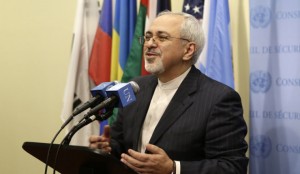 Having been relatively quiet during the 10-day Geneva II conference, Irans Foreign Minister Mohammad Javad Zarif dismissed Syrias opposition on Saturday.
Having been relatively quiet during the 10-day Geneva II conference, Irans Foreign Minister Mohammad Javad Zarif dismissed Syrias opposition on Saturday.Zarif said on the sidelines of the Munich Security Conference, I do not believe that negotiating based on illusions of the power of the opposition in Geneva, which hardly controls any ground inside Syria and may not even be welcomed into territories that are even controlled by the armed groups inside Syria given the false promises and false hopes helps achieve a peaceful resolution to this very tragic conflict.
Zarif said there to be a setting of realistic goals, allowing the Syrian people to determine their own future.
With the regime refusing to commit to a second round of talks from February 10, Iranian media is pressing the idea of a domestic opposition which can find a political resolution with Damascus.
Fars News, linked to the Revolutionary Guards, writes this morning:
Head of Syrias Al-Watan Party Majd Al-Nayazi announced that the main spectrum of the Syrian opposition who are inside the country plans to hold a conference, a move which shows the wide rift between the opposition at home and those residing abroad who were in Geneva just last week for talks with the Damascus government.
Al-Nayazi pointed to the lack of achievement by the Geneva II conference, and said, The Syrian opposition are preparing the grounds to hold Damascus I conference where all opposition parties, except the Syrian National Coalition (SNC) and also some foreign-based opposition, will be present.
He reiterated that the opposition groups who attended the Geneva II represented only a small part of the opposition and the main opposition groups have been sidelined at the US order.
US Secretary of State Kerry Meets Foreign Minister Zarif in Munich
US Secretary of State John Kerry and Foreign Minister Mohammad Javad Zarif met on the sidelines of the Munich Security Conference on Sunday morning.
A State Department official said the two discussed forthcoming talks on a comprehensive nuclear agreement: Secretary Kerry reiterated the importance of both sides negotiating in good faith and Iran abiding by its commitments under the Joint Plan of Action (in Novembers interim deal). He also made clear that the United States will continue to enforce existing sanctions.
By EA WorldView
The Iran Project is not responsible for the content of quoted articles.










